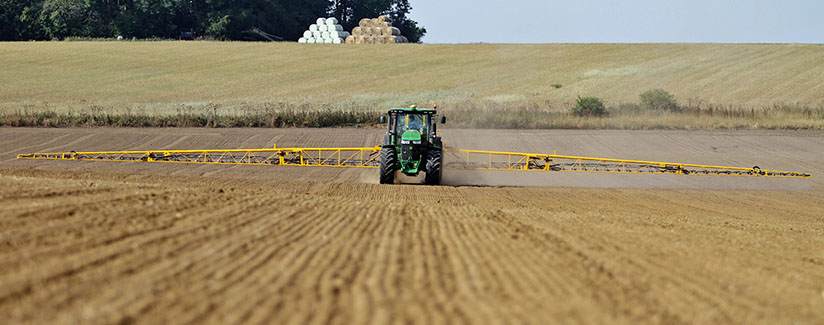
Should You Be Concerned with Pesticides on Produce?
10/28/2013
In all forms, fruits and vegetables are inherently nutritious, no matter whether eaten fresh, canned or frozen. In recent years, a number of marketing tactics have presented organic fruits to be safer, based on the premise that they are grown without pesticides. In truth, both organic and conventional farmers use pesticides on their crops.
By definition, a pesticide is used to kill, repel or control plant or animal life that is considered to be a pest to the growth of the fruit and vegetables.
We’ve asked Dr. Carl Winter, Director of the FoodSafe Program at the University of California, Dr. Ruth MacDonald (also a registered dietitian), Chair and Professor of the Department of Food Science & Human Nutrition at Iowa State University and Dr. Wendy Dahl, Assistant Professor in the Food Science and Human Nutrition Department at the University of Florida, for insights on pesticides and on our fruits and vegetables. You can read those interviews below.
But first, check out this summary based on the pesticide calculator from www.SafeFruitsAndVeggies.com.

Expert Insights
Dr. Winter:
We have a saying in toxicology “it’s the dose that makes the poison.” It’s the amount of the chemical rather than the presence or absence that determines the potential for harm. In the case of pesticide residues on food, we can detect them, but generally at very tiny levels. I think consumers are concerned because they’re aware that these chemicals, which have potential toxic effects, show up on foods. However, the levels at which we detect these pesticides are so low consumers have nothing to worry about.
As for pesticide use, organic food is not guaranteed to be free of pesticides. Organic food production allows the use of several EPA registered pesticides, mostly being of natural origin. Although studies claim you are much less likely to find pesticide residue in organic foods, some surveys found nearly 30% of the organic samples tested had some detectable level of pesticides.
Using our best available data, typical consumer exposures to pesticides in the diet are at levels of 10,000 to 100,000 times lower than levels that have been fed to laboratory animals on a daily basis throughout the animals’ lifetimes that have shown no effects in the animals.
I recently published a review of the 10 most common pesticides EWG tested on each of the top 12 “most contaminated” fruits and veggies. What I found in the vast majority of cases was that our typical exposure to pesticides from those foods was generally a million times lower than doses that haven’t even caused affects in animals. In short, even for the “most contaminated” produce on their list, the level of pesticide exposure is incredibly low.
The Alliance for Food and Farming developed a pesticide calculator. This tool illustrates that pesticide residues do exist in the food supply but they are at levels so low that there should not be any consumer risk. The important thing consumers should recognize is they need to eat a diet with lots of fruits and vegetables, whether they’re organic or conventional. That’s the best thing they can do for their health.
Results many studies confirm that exposures to current use pesticides are at only a tiny fraction of levels considered to represent a “reasonable certainty of no harm,” so any further reduction in exposure to pesticides from consumption of organic fruits and vegetables is not likely to be of any appreciable health benefit. In terms of exposure to “persistent organic pollutant” pesticides, these pesticides may be present in small amounts in fields for which both organic and conventional agricultural techniques are practiced. Evidence supporting this hypothesis comes from the results of the California Department of Pesticide Regulation’s 2010 monitoring of organic and conventional fruit and vegetable samples analyzed for pesticide residues. These results showed that out of 137 organic fruits and vegetables sampled, four samples (2.9%) showed detectable residues of DDE, and 53 samples of conventional fruits and vegetables out of 2,883 (1.7%) showed detectable residues of DDE.”
Dr. MacDonald:
There is a widely held thought that conventionally grown fruits and vegetables are loaded with pesticide and herbicide (chemical) residue. This is simply not supported by facts. The FDA and USDA routinely monitor the food supply for chemical residues and post results on their websites. What may be surprising is that organic foods also contain chemical residues from organic-approved chemicals used in their production, or those accumulated from the environment (same as for conventional foods). The fact is this: we are exposed to chemicals all the time from the air and water, and in cars, houses and workplaces – and even in things like cosmetics. The amount of exposure from food residues is far less than all of these.
Consumers are readily frightened by legitimate research stories where large doses of a chemical are shown to have some negative aspect on health (usually in animal research). The issue with those findings is that the dose amounts in the study are far greater than would be achieved by eating normal amounts of fruits and vegetables. When the studies are published, media and other groups oftentimes conclude that the chemicals are dangerous because they are present in food, but they aren’t paying attention to the amount of exposure that is normal and acceptable to consume. Scientists who study this always say that it’s not the presence or absence of a chemical; it’s the amount or dose present.
Dr. Dahl:
It would be very difficult to design a study that directly compared the long term safety of consuming organic versus non-organic produce. The US Environmental Protection Agency (EPA) though, monitors pesticide residues in foods to ensure that our exposure is low enough to be considered safe. According to the US FDA, pesticide residues in the U.S. food supply are “well below established safety standards”.
Consumer Insights
Blogger Amina Nevels of Momma Mina shares why organic is not the only choice: Bamboozled: Organic Farming is an attempt to capture high-value markets and premium prices.
“IMG_1309 (2400×1600)” by Chafer Machinery is licensed under CC BY 2.0.




























